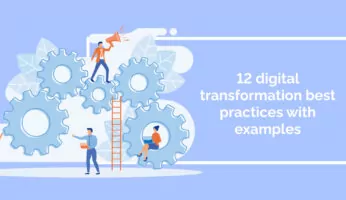
Intelligent automation for HR can benefit the HR professional in a number of ways, from streamlining workflows to increasing productivity to reducing costs.
But to adopt the technologies in this emerging field, it is first necessary to understand what intelligent automation is, what it isn’t, and how it can be used.
The Present and Future of Intelligent Automation for HR
In this guide, we’ll learn how intelligent automation tools are helping to drive HR transformations in companies around the world. Before we examine its impact on HR, though, let’s answer the basic question:
What is intelligent automation?
Automation platforms perform tasks normally done by people.
Intelligent automation, or cognitive automation, refers to a set of AI-powered technologies that automatically perform low-level cognitive tasks.
When used in conjunction with tools such as robotic process automation (RPA), intelligent automation can even perform tasks that require basic decision-making. As this technology progresses, it will become possible to automate even more complex tasks, including those that require human judgment.
The benefits of intelligent automation
There are many benefits to investing in intelligent automation, including:
- Cost savings
- Increased speed and efficiency
- Fewer mistakes
- Improved productivity and performance
While the exact benefits depend greatly on the circumstances – where and how automation is applied – intelligent automation can generate significant returns wherever it is applied.
How automation is changing HR
HR professionals can use automation for virtually any workflow or process, including:
- Hiring and recruitment
- Employee onboarding
- Employee training
- Employee offboarding
- Payroll, accounting, and attendance
- Communications
The proper use of these tools in HR can lighten workloads and improve the outcomes of HR business processes, among other things.
How to adapt to and adopt intelligent automation tools
Here are a few tips to streamlining the adoption of intelligent automation in HR:
- Understand the pros and cons of intelligent automation
- Learn what tools are available
- Evaluate existing solutions
- Make a case for the business value of automation in HR
- Earn support from executives
- Create and execute a digital adoption strategy
- Monitor results and adjust workflows over time
As with any other organizational change, the adoption of intelligent automation requires an investment of time, money, and resources. Also, it is important to keep in mind that change is often difficult – for that reason, it is important to understand the principles of change management and adhere to change management best practices.
Do humans still have a place in HR?
The short answer: yes.
The long answer is that the workplace is changing – the digital workplace of tomorrow will look very different from the one many of us are used to.
For instance, according to most research firms and experts, in tomorrow’s workplace:
- Automation will be the norm
- Continual learning will become mandatory for employees to stay successful
- Continuous change and improvement will become standard for organizations
- The most successful companies will be digital-first
- The dynamics between humans and machines will change
Ultimately, many feel that we are currently undergoing a major technological revolution, not unlike the industrial revolution. While that change may be uncomfortable for many – and while it will result in job displacements and shifts in workplace dynamics – it will also result in net benefits for the majority of workers.
How HR professionals can prepare for the automated future
No one can predict the future with perfect precision.
However, many of tomorrow’s technological changes are already “in the pipeline,” which means we know they are coming and can therefore prepare for them.
Here are a few points to keep in mind when it comes to HR, automation, and the future of work:
- Continual change will become a hallmark of tomorrow’s workplace – keeping up will require a pro-learning mindset that prioritizes digital technology and adaptation
- Digital innovation will generate new types of jobs that didn’t exist before – the increased adoption of digital adoption platforms (DAPs), for instance, will increase the need for HR professionals with digital adoption skills
- Intelligent automation may be able to augment and automate cognitive tasks, but not empathy – humans who cultivate skills that AI cannot replicate, such as soft skills, will therefore be more valuable in the future workplace
- The remote workplace and the hybrid office will become more common – so HR professionals will need to take steps to adapt to this new normal, by, for instance, designing remote-friendly HR workflows and implementing remote training software
Perhaps most importantly, HR professionals should recognize that disruptive change is coming and be ready for it.While resistance to change may be our instinctive reaction to anything new and unfamiliar, it can also impede our own growth. Also, it is worth noting that those of us who embrace change earlier will be better prepared than those that do not.
WalkMe Team
WalkMe spearheaded the Digital Adoption Platform (DAP) for associations to use the maximum capacity of their advanced resources. Utilizing man-made consciousness, AI, and context-oriented direction, WalkMe adds a powerful UI layer to raise the computerized proficiency, everything being equal.



